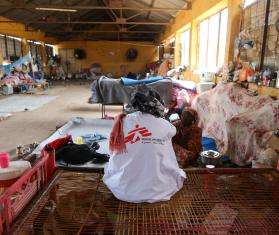MSF Calls for WHO Support for More Effective Treatment
New York/Paris, 12 December 2000 — Burundi is currently suffering a malaria epidemic of unprecedented proportion; more than 6 of the country's 16 provinces are effected. More than 720,000 cases were registered in the country in November, including 60,435 new cases in the province of Kayanza (which has a population of approximately 510,000 people), and more than 46,000 in the area of Musema, the most effected in the province. The mortality rates are alarming. A survey carried out by Doctors Without Borders/Médecins Sans Frontières (MSF) in this sector between October 13 and December 6, 2000, evaluated the mortality rate of children under five at 3.8 for 10,000 people per day, well above the emergency threshold of 2/10,000 per day. The figures show that 1,000 people died from malaria during this period, half of which were children under five.
In collaboration with the Burundian health authorities, MSF is working in three provinces that have been particularly effected, Kayanza, Ngozi, and Karuzi, i.e. a total population of 1.4 million people. The teams diagnose and treat patients as well as provide drugs and materials to 16 health centers in these provinces. "Our teams are faced with a huge influx of people presenting signs of malaria," explains Colette Gadenne, head of mission for MSF in Burundi."In the health center of Muhanga alone, there are up to 600 patients a day. The Burundian medical staff is overwhelmed and many centers have run out of anti-malarial drugs."
Furthermore, since the beginning of the epidemic, it is above all adults that come to the health centers. "Many children may have died from lack of timely treatment", adds Colette Gadenne. Eight mobile teams have been set up around 20 sites to improve access to health care in the provinces of Kayanza, Ngozi, and Karuzi. Each team treats a minimum of 200 patients a day. A vector control program has also been set up in Kayanza: 9000 houses spread over 27 hills are to be sprayed with insecticide in December by a team of over 100 people. 2000 houses will likewise be sprayed in the province of Karuzi and 15,000 impregnated mosquito nets will be distributed.
There is great concern at the renewed outbreaks of malaria in Burundi: last year there were over 2 million cases (for 6 million inhabitants), compared to 200,000 cases ten years ago. The current epidemic has erupted in medium to low endemic areas. The population is therefore less immune which explains the explosion of the number of cases and the high mortality. The development of planting in marshland in which vector mosquitoes proliferate, the stop of vector control programs and the probable resistance to Cholorquine may explain this epidemic.
The protocols adopted are Chloroquine/Fansidar for simple cases of malaria and Quinine for severe malaria. However, in the context of this epidemic, MSF requests the support of the World Health Organization (WHO) and its Roll Back Malaria Department in the use of combination therapies based on Artemisinine derivatives. These associations would offer more effective, rapid treatment and would thus be more adapted to control the epidemic.
MSF has been present in Burundi since 1992. The MSF teams have been reinforced to cover this epidemic. There are currently 24 volunteers and 400 national staff working in 3 provinces.



